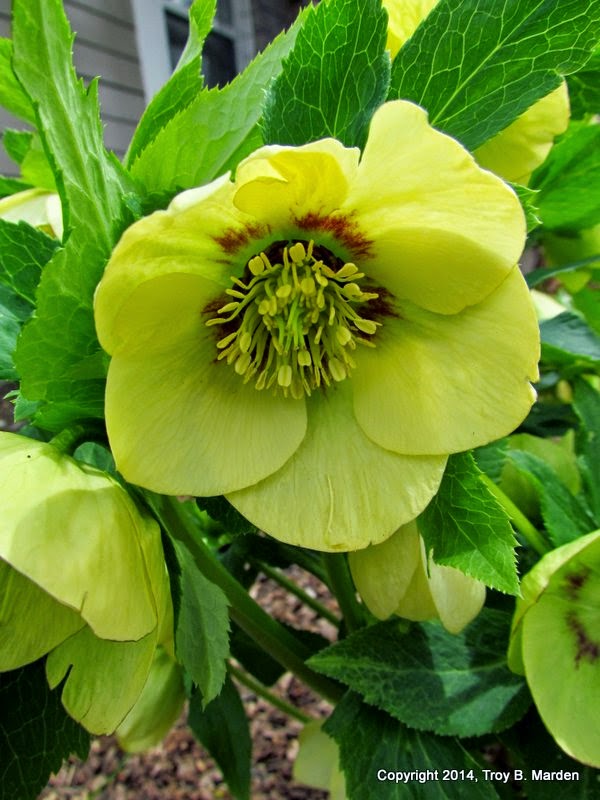Don’t get too comfortable in your shorts and flip-flops just yet, for winter will most assuredly return for another round or two or three. But as I was out and about our fair city today, I couldn’t help but notice that spring–just when I need it the most–has finally begun to peek slowly and cautiously out from under the blanket and that the landscape’s long slumber is coming to an end.
The first sure sign of spring each year is this lawn full of crocus that flowers in mid- to late February–like clockwork–regardless of the weather, reminding me that spring, indeed, is but a few weeks away. And while I know we’ll have more cold temperatures, more of those infuriating late spring frosts that nip the buds of over zealous tender plants pushing through the soil too soon, and maybe even a little more snow (but I sure hope not), I know for sure that winter is losing a fighting battle and that spring will prevail.
The witchhazel also tells me that spring is on its way. In my own garden, Hamamelis x intermedia ‘Arnold Promise’ has chosen to unfurl it’s blooms early this year. It is usually the last of the witchhazels to flower, and this year, it’s one of the first! What’s a gardener to do?
Another plant that helps get me through winter’s blah and boring days is this beautiful “Christmas Rose”–which is about as closely related to a rose as you are to a dinosaur–therein the problem with common names. But I digress… Helleborus niger ‘Josef Lemper’ has proven beyond the shadow of a doubt that it is going to be a great garden plant. I only planted it in August and it was not a huge plant to begin with, but it is now on it’s third round of bloom since the first week of December and even had buds pushing up through the melting snow in January!
For a big, bright splash of color in the late winter landscape, I can always rely on this small patch of Iris reticulata. Although its flowers last only about a week–maybe 10 days in a good year–it’s just the right week every year. The week when I need to be reminded that winter won’t last forever!
And snowdrops. All the rage in England for decades, American gardeners are now beginning to get interested in them beyond just the common species. I snapped this photograph in a Nashville garden today. It has been a damp, chilly day, and the light was terrible for photographing the crocus that I really wanted to shoot, but it was overcast enough that the white flowers didn’t glare and “burn out”, so all in all it turned out okay. Back to photograph the crocus on Friday, if tomorrow’s rain doesn’t destroy them. If it does, there’s always next year and that’s part of the beauty of the garden.
When I was headed downtown earlier, I decided to take a quick spin through Centennial Park and see what was flowering in the garden there on the north side of the Parthenon. I’m sure glad I did. Otherwise, I would have missed this beautiful witchhazel, Hamamelis mollis ‘Pallida’.

Contrary to popular belief, the following photgraph is NOT forsythia! It’s too early! And it’s the wrong color, and it has 5 petals and not 4–and, and, and….. Oh, sorry. You now know one of my biggest late winter and early spring pet peeves. This graceful, beautiful, weeping, yellow-flowered, fragrant shrub is always confused with Forsythia when in actuality it is a jasmine. Jasminum nudiflorum–winter jasmine–to be precise. It makes a great groundcover or cascading shrub and while I was a mite irritated when I found that the landscape team at this particular establishment had begun shearing this row like a hedge (it used to cascade beautifully to the ground)–I have to admit that it’s rather stunning in bloom, even sheared within an inch of its life.

And last, but certainly not least, a rather unusual and lesser known (by the gardening public, anyway) cousin of the witchhazel, Parrotia persica. These flowers will “puff up” a bit, but what you see is basically what you get. It’s not really grown for its blooms and in fact, I watched at least 20 people walk right past this today and never look up. But even if its blooms aren’t showy, it has beautiful, smooth, silver-grey bark and its tapestry of fall color in shades of red, orange and gold is second to none.
So there you have it! Spring is officially on its way. Winter beware. You might have a few good gusts left in you, but you’re not going to win this fight and for this year, anyway, I say good riddance.









